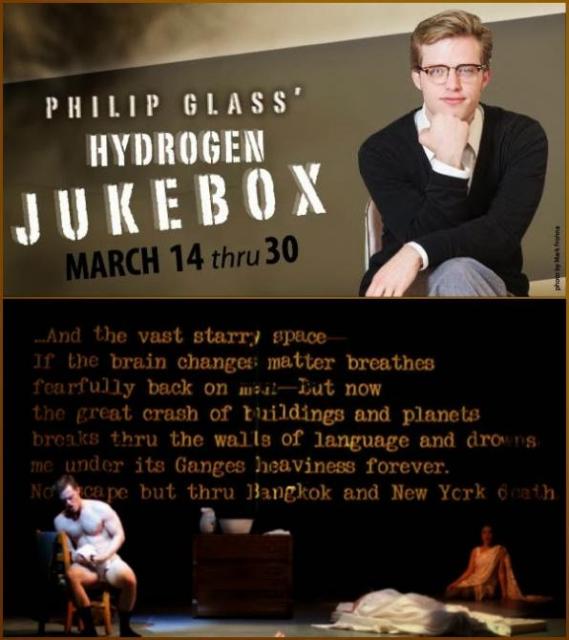
Milwaukee’s venerable Skylight Music Theater has taken a bold new direction under the leadership of Skylight artistic director Viswa Subbaraman. It is almost inconceivable that a theater company which broke box-office records two years ago with The Sound of Music is now staging an avant-garde work that is neither a musical nor an opera. Instead, audiences at Hydrogen Jukeboxare ushered into a strange – sometimes bizarre – environment, as conceived by the late poet Allen Ginsberg and composer Phillip Glass.
This unique collaboration occurred after a chance meeting between the two men in a New York bookstore. It resulted in a performance art piece that the creators envisioned as a “theatrical portrait of America from the 1950s to the 1980s.” Since the poet in question is Allen Ginsberg, one can expect to find many themes he repeated frequently in his work: the anti-war movement, the sexual revolution, drugs, Eastern philosophy and environmental awareness.
It should be noted that the “hydrogen” in Hydrogen Jukebox does not refer to a component of water. The term, taken from Ginsberg’s most famous poem, “Howl,” refers to the hydrogen bomb. It indicates the explosive combination of words and music that sometimes describes this production.
In this Jukebox, the entire stage is bare, clear to the theater’s back wall. A man dressed in 1950s-style clothing walks out and begins to recite a poem (“Iron Horse”). It tells of Ginsberg’s train trip through Oklahoma, and his impressions of that experience. We imagine this actor/singer (the dazzling Dan Kempson) to represent Ginsberg himself. As the poem continues, a handful of men and women – all dressed in identical slacks, shirts and sweaters – begin to join him in a slow-moving, almost dazed procession. They bring out bits of furniture – one holds a lamp, another one wheels out a desk – until the stage becomes a living room set. The cast consists of six performers – three men and three women. Sometimes they sing, their operatic voices easily rising to the top balcony. Sometimes, the women wail in unison as one of the men speaks.
In order to enhance the performance’s visual appeal, a series of projections is so prominent that it almost can count as a character in itself. Sometimes, the projections cast a stanza of a poem against a wall. Or a desk. Sometimes, video projections enhance the effect, such as showing a slow-moving fleet of battleships pushing against angry waves. Perhaps the most striking visual image is the time-lapse video of a hydrogen bomb going off. These images (created by Sven Ortel) are so mesmerizing that Phillip Glass’ music is less prominent than it could be. Only a few times do the performers stop, as if to listen to the gently rolling sounds that are so common in Glass’ work. It is not difficult to guess that Skylight subscribers who marveled over The Sound of Music may not be so enchanted by the gay sex shown onstage in Jukebox. To be fair, the men’s romantic embrace doesn’t end in a full-scale sexual encounter. They never take off their Jockey shorts, for instance. The scene is a reminder of Ginsberg’s own experience as a gay man who lived with a longtime male partner. Later in the show, a less physical gay episode is more dreamlike in nature, as if Ginsberg is looking back at his own past.
The trajectory of Jukebox starts out as a highly political statement, and ends as a quieter, more personal one. Under the direction of Ted Huffman, all of the show’s elements – actors, lighting, stage design, projections – work harmoniously to create a memorable and unique experience not seen previously in Milwaukee (at least, not on this large a scale).
In his tribute “To Aunt Rose,” for instance, Ginsberg probes the essence of his elderly aunt’s behavior and character. But politics are never far from Ginsberg’s mind. Only a few poems later, in “CIA Dope Calypso,” all six performers are moving in gyrating calypso rhythms. One of them wears a Ronald Reagan mask. This is probably the humorous high point of the entire show, and it’s a credit to choreographer Zack Winoker that it is done so well. The scene demonstrates the insanity of international politics that continues to be played out in current times.
Indeed, many of the issues that Ginsberg championed in his lifetime are still a long way from a reaching reasonable solution. Jukebox may have been created in the Beat era of the 1940s and 1950s, but the sights, sounds and emotions still resonate today.
